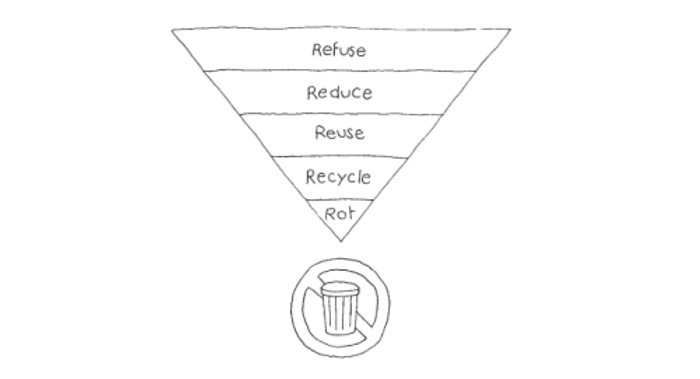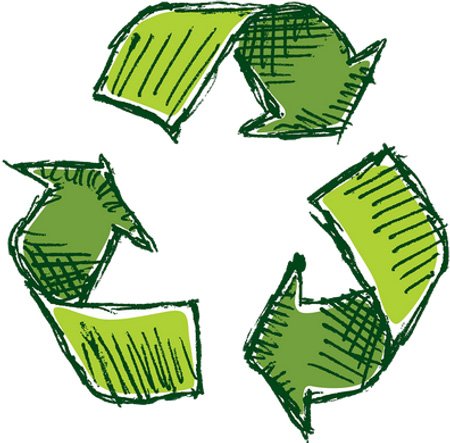Unfortunately, it is now enough to look around to see that the world is extinct. Even if we are not familiar with the terminology and specialistic areas such as environmental policy, ecosystems, biodiversity, we are aware that something is wrong. The concrete buildings where we live prevailed over trees. The seasons are not what we used to know, and food is now almost toxic. Our longing for the sea in coastal cities is a picture of sadness in itself. We may be worried about all of this individually, or even collectively in friendly circles, complaining about environmental issues. So, have we ever thought about adding our love of nature to our life practices by taking an important step instead of assuming that we cannot overcome the issues?

There is a way of life that has recently begun to be heard quietly but confidently: zero waste. This movement, which has an ethical side besides its social, economic and ecological dimensions, reminds us that nature does not produce garbage, and we can live without producing waste and forgetting that we are a part of nature. To facilitate its adoption, some catchy implementation steps have been determined abroad. I wanted to share with you a brief informative article to understand exactly how to realize the zero waste life that we have heard a little, maybe seriously researched. Perhaps we will not hear anything new in these basic rules that we can code as 5R based on English terms. Let’s remember the nature-friendly practices we forgot and apply them to our lives together.

5R
1️. Refuse: We should be able to say no to what we don’t need. The most important item, especially in terms of removing disposable products from our lives, is to refuse. We should be able to say “No” to a product that we find wrong, that we do not need, that we cannot reuse or have no chance of recycling. The importance of refusing is not to take into our lives any waste product that cannot participate in the natural cycle from the very beginning. Refusing disposable plastic straws, glasses, bags or bottles is one of the easiest ways to reduce waste, which is both easy and healthy.
2. Reduce: Again, we can reduce our waste amount by not purchasing what we don’t need. Even if it is nature-friendly, it is extremely sad to buy, spend money and time, and try to make our lives meaningful through materials. It is best not to associate consumption and happiness with each other. Live minimally, be happy! It’s a good way to shop only when we need it, not to back it up, buy better quality and environmentally friendly products and use them for longer.
 3. Reuse: Nothing like reusing items that are still usable after meeting our needs, that can work in other areas. We rejected the bad, made our life minimal, made our items long-lasting and multi-functional. Isn’t it comforting to even think? I think of glass jars or tin cans as the simplest examples. The usage area of glass jars, which will be found in every home, is unlimited to me. For example, I also use tin cans as flower pots. I grow lemon in one and a tangerine in the other. All I had to do was drill a few holes in the bottom to prevent excess water from accumulating. Another important point here is to be able to share our belongings that we think others can use again. Clothes, bags, books, furniture, electronic devices or any other item will perhaps do more for someone else than we do. We can first ask our close friends and family, then maybe donate or sell what we have in excess.
3. Reuse: Nothing like reusing items that are still usable after meeting our needs, that can work in other areas. We rejected the bad, made our life minimal, made our items long-lasting and multi-functional. Isn’t it comforting to even think? I think of glass jars or tin cans as the simplest examples. The usage area of glass jars, which will be found in every home, is unlimited to me. For example, I also use tin cans as flower pots. I grow lemon in one and a tangerine in the other. All I had to do was drill a few holes in the bottom to prevent excess water from accumulating. Another important point here is to be able to share our belongings that we think others can use again. Clothes, bags, books, furniture, electronic devices or any other item will perhaps do more for someone else than we do. We can first ask our close friends and family, then maybe donate or sell what we have in excess.
 4. Recycle: Look, we could only come to recycling, that is, the penultimate step. Despite the understanding of zero waste as recycling, you should first look at the first four stages to be aware of the whole picture rather than seeing only one-fifth of the picture. It is a duty for all of us to learn the glass symbols for recycling and deliver the wastes that can be recycled into the economy to the municipalities. We should be able to go back to the first step and say “No” for disposable, non-recyclable materials.
4. Recycle: Look, we could only come to recycling, that is, the penultimate step. Despite the understanding of zero waste as recycling, you should first look at the first four stages to be aware of the whole picture rather than seeing only one-fifth of the picture. It is a duty for all of us to learn the glass symbols for recycling and deliver the wastes that can be recycled into the economy to the municipalities. We should be able to go back to the first step and say “No” for disposable, non-recyclable materials.
5. Rot: Composting! This is actually where the story of rebirth that takes place in the heart of nature begins. If our kitchen waste – vegetable and fruit scraps, eggshells, tea and coffee grounds – can be returned to the ground cleanly, we don’t need to do anything. Worms and other small creatures perform their duties without interruption. Unfortunately, we mostly live in concrete buildings and apartments – that have been deprived of the garden, which prevail over trees. Also in those who have been deprived of the garden. If you know someone who can compost, if you can make Bokashi compost or find another way, please do not skip because the most precious ones come directly from nature. Remember, they should go back to nature.

Özge is a student at Boğaziçi University, Department of Political Science and International Relations. She has been in love with nature since her childhood. She always thought about the environment. Yet, it took a lot of reading and a lot of research to really act for her. When she decided to live zero waste she started blogging to announce what she had researched and learned and to learn more. She started to run an Instagram account called Reasons from the World (Dünya’dan Sebepler, in Turkish). She is interested in sustainability, environmental policies and ecological life.

Leave a Reply
You must be logged in to post a comment.